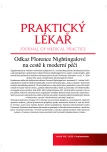-
Medical journals
- Career
Coping of students in study programs General nursing and Paramedic
Authors: M. Kopecký 1; chal. J. Pospí 2; Z. Červenková 2; I. Černohorská 2
Authors‘ workplace: Fakulta zdravotnických studií, Univerzita Pardubice, Katedra ošetřovatelství 1; Fakulta zdravotnických studií, Univerzita Pardubice, Katedra klinických oborů 2
Published in: Prakt. Lék. 2020; 100(Supplementum): 22-26
Category:
Overview
Introduction: The study is focused on the description of stress management strategies in students of general nurse and paramedic study programmes. Stress is an integral and everyday part of these two occupations. Constant changes, patient care or even life-saving procedures that, despite all efforts, end in death, all these events cause over-limit and long-term stress.
Objectives: This study aims to describe the differences in the use of positive and negative coping strategies in students of general nurse and paramedic, including comparison with the population standard.
Methods: Cross-sectional questionnaire survey by SVF-78. The sample of respondents consisted of 74 students of the paramedic and 50 students of the general nurse.
Results: Statistical processing of the results revealed that there was a statistically significant difference in the overall use of strategies between general nurse and paramedic (p = 0.005). The results are the same in the use of positive strategies, but in the use of negative strategies, they differ in favour of paramedics (p = 0.001). However, both fields show higher scores than the population standard (p = 0.003 resp. p = 0.001).
Conclusion: Although the results show that medical students have well-developed coping strategies of stress towards the general population, a closer examination revealed that students of nursing used more negative strategies, especially escape from the problem, inability to detach and feel helpless.
Keywords:
Coping – SVF-78 – general nurse – paramedic
Sources
- Ashford, K., & Lawrence, J. (2006). How do students cope?: Copig strategies adopted by undergraduate students. Získáno 8. prosince 2018 z http://www.leeds.ac.uk/educol/documents/161813.htm
- Bartlett, M., Taylor, H., & Dirk Nelson, J. (2016). Comparison of Mental Health Characteristics and Stress Between Baccalaureate Nursing Students and Non-Nursing Students. Journal of Nursing Education, 55(2), 87-90. doi:10.3928/01484834-20160114-05
- Bodys-cupak, I., Majda, A., Zalewska-puchała, J., & Kamińska, A. (2016). The impact of a sense of self-efficacy on the level of stress and the ways of coping with difficult situations in Polish nursing students. Nurse Education Today, 2016(45), 102-107. doi:10.1016/j.nedt.2016.07.004
- Honzák, R. (2018). Jak žít a vyhnout se syndromu vyhoření (3. vydání. vyd.). V Praze: Vyšehrad.
- Humpl, L., Prokop, J., & Tobiášová, A. (2013). První psychická pomoc ve zdravotnictví (Vyd. 1. vyd.). Brno: Národní centrum ošetřovatelství a nelékařských zdravotnických oborů.
- Humpl, L., Vraspírová, H. & Marková, M. (2013). Psychosociální intervence ve zdravotnictví. Ziskáno 15. ledna, 2020 z: https://www.unbr.cz/Data/files/Konf%20MEKA%202013/7%20
- abstrakt%20Humpl.pdf
- Labrague, L., Mcenroe-petitte, D., Gloe, D., Thomas, L., Papathanasiou, I., & Tsaras, K. (2017). A literature review on stress and coping strategies in nursing students. Journal of Mental Health, 26(5), 471-480. doi:10.1080/09638237.2016.1244721
- Laranjeira, C., A. (2012). The effects of perceived stress and ways of coping in a sample of Portuguese health workers. Journal of Clinical Nursing. 12(11), 1755 - 1762. ISSN: 1365-2702. DOI: 10.1111/j.1365-2702.2011.03948.x. Získáno 14. ledna 2019 z https://onlinelibrary.wiley.com/doi/abs/10.1111/j.1365-2702.2011.03948.x
- Mair, R., Onos, K., & Hembrook, J. (2011). Cognitive Activation by Central Thalamic Stimulation: The Yerkes-Dodson Law Revisited. Dose-Response, 9(3), 313–331. doi:10.2203/dose-response.10-017.Mair
- Marešová, L., & Trešlová, M. (2017). Zvládání zátěžových situací ošetřovatelským personálem. Psychologie a její kontexty, 2017(8), 55–65.
- Paulík, K. (2017). Psychologie lidské odolnosti (2., přepracované a doplněné vydání. vyd.). Praha: Grada.
- Pelcák, S. (2015). Stres a syndrom vyhoření (Vydání první. vyd.). Hradec Králové: Gaudeamus.
- Sand, M., Hessam, S., Sand, D. et al. Stress-coping styles of 459 emergency care physicians in Germany. Anaesthesist 65, 841–846 (2016). https://doi.org/10.1007/s00101-016-0228-6
- Smith, G., & Yang, F. (2017). Stress, resilience and psychological well-being in Chinese undergraduate nursing students. Nurse Education Today, 49(90-95), 90–95. doi:10.1016/j.nedt.2016.10.004
- Vévodová, Š., Ročková, Š., Kozáková, R., Dobešová-Cakirpaloglu, R., Kisvetrová, H., & Vévoda, J. (2016). Copingové strategie a jejich vztah k syndromu vyhoření u onkologických sester. Psychologie a její kontexty. Ostrava: Univerzita Ostrava. Získáno 25. února 2019 z 69 http://psychkont.osu.cz/fulltext/2016/Vevodova-et-al_2016_1.pdf
- Yilmaz, E. (2016). Academic and clinical stress, stress resources and ways of coping among Turkish first-year nursing students in their first clinical practice. Kontakt, vol. 18(issue 3), e145–e151. https://doi.org/10.1016/j.kontakt.2016.08.001
Labels
General practitioner for children and adolescents General practitioner for adults
Article was published inGeneral Practitioner

-
All articles in this issue
- Patient satisfaction with the management of acute postoperative pain in a medical facility
- Nurses‘ Role in Prescribing Medication
- Coping of students in study programs General nursing and Paramedic
- Initial experience with the Czech version of the Sydney Swallow Questionnaire
- Clinical simulation as a method in midwifery teaching
- Quality of Life of Patients after Polytrauma in Relation to the Injury Severity Score
- Development of healthcare professionals’ roles – a physician’s perspective
- Factors Influencing Job Satisfaction and Motivation of General Nurses
- Knowledge, Attitudes, and Practices of Oral Care in Mechanical Ventilated Patients
- General Practitioner
- Journal archive
- Current issue
- Online only
- About the journal
Most read in this issue- Factors Influencing Job Satisfaction and Motivation of General Nurses
- Coping of students in study programs General nursing and Paramedic
- Nurses‘ Role in Prescribing Medication
- Clinical simulation as a method in midwifery teaching
Login#ADS_BOTTOM_SCRIPTS#Forgotten passwordEnter the email address that you registered with. We will send you instructions on how to set a new password.
- Career

